Inside TCU’s housing crunch:
‘No more cushion’ for extra beds leaves some students sleeping in hotels, cars
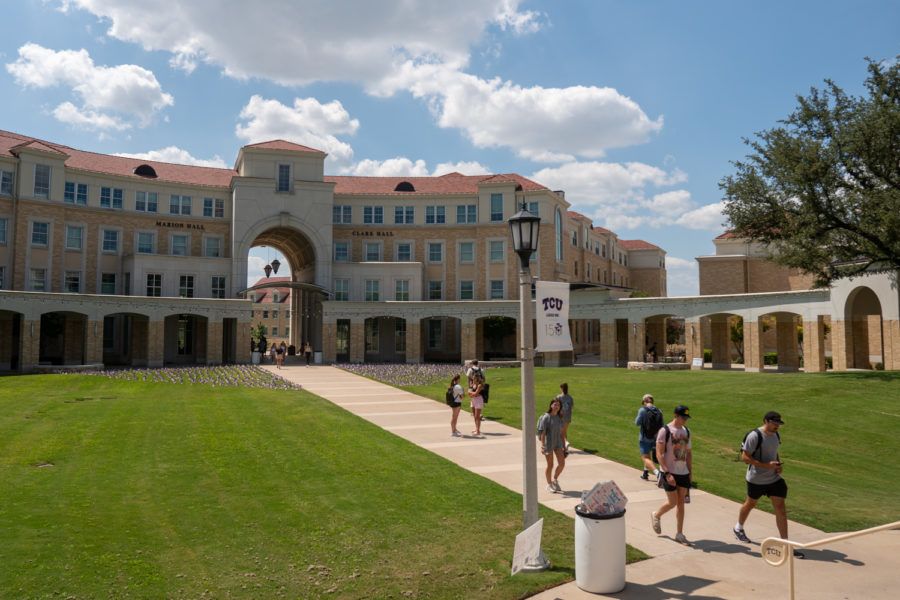
Sophia Suarez Wallace moved three times in two weeks.
In early August, she was told campus housing was full. The sophomore transfer student thought she was guaranteed a spot because of TCU's rule that all first-year students and sophomores live on campus.
She was wrong.
Housing officials were prepared for 2,300 first-year students — the final count came to 2,491. That’s not including the 390 transfer students.
“This fall, we’re as tight as we've ever been,” said Craig Allen, executive director of housing and fraternity/sorority life. “We can't keep going through falls where we open and we're so overoccupied that hundreds of students are living in triples and lounges and that transfer students are living in hotels and in their cars because we don't have a place for them.”
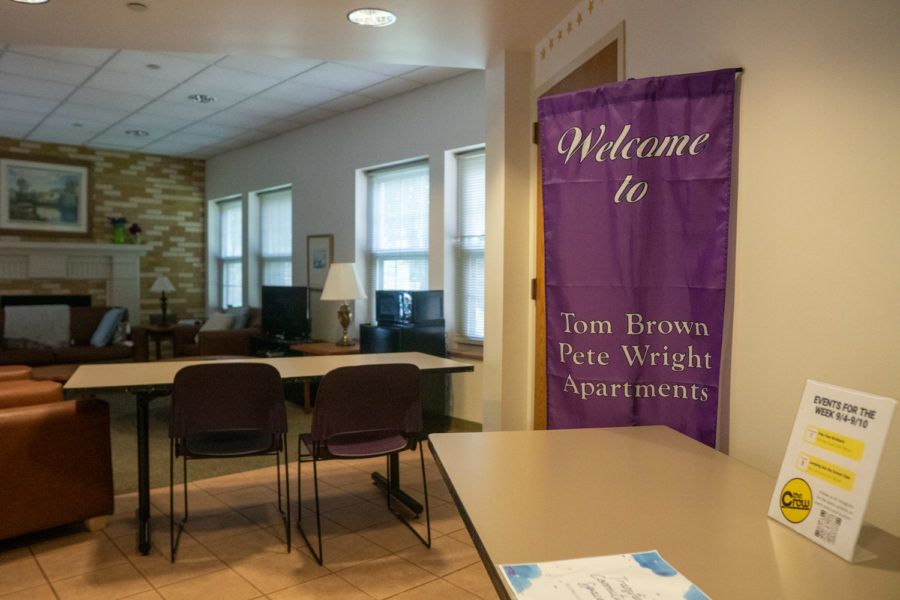
Tom Brown/Pete Wright apartment common area on Sept. 9, 2022.(Esau Rodriguez Olvera/Head Staff Photographer)
Tom Brown/Pete Wright apartment common area on Sept. 9, 2022.(Esau Rodriguez Olvera/Head Staff Photographer)
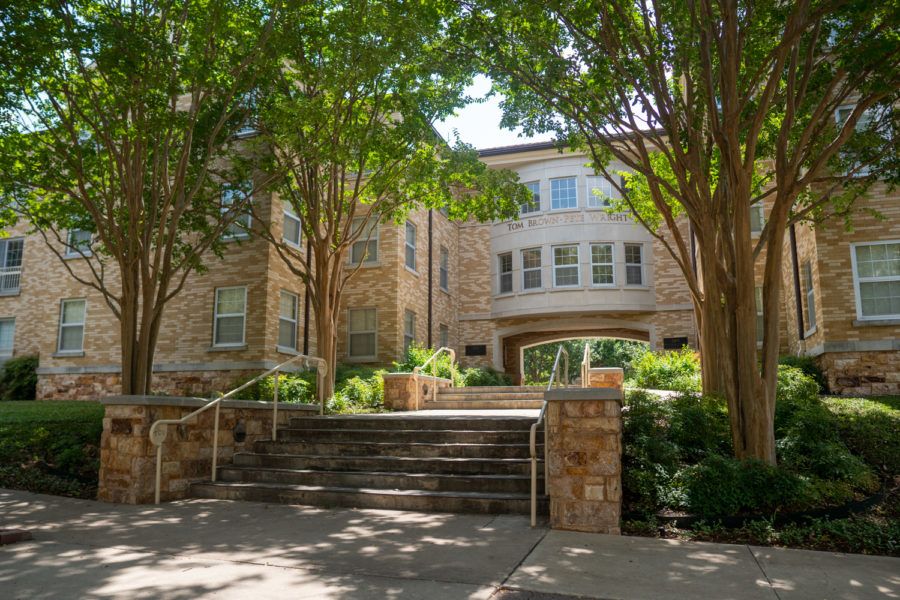
Tom Brown/Pete Wright apartments on Sept. 9, 2022. (Esau Rodriguez Olvera/ Head Staff Photographer)
Tom Brown/Pete Wright apartments on Sept. 9, 2022. (Esau Rodriguez Olvera/ Head Staff Photographer)
For the second consecutive year, TCU’s first-year enrollment has exceeded expectations, forcing housing officials to shuffle students.
Sophomores were shifted to more independent spaces, such as the Tom Brown/Pete Wright apartments on campus and Liberty Lofts near Bluebonnet Circle – leaving room for only 500 juniors and seniors on campus.
Housing was already squeezed.
Last year, fall undergraduate enrollment jumped 5.3% to 10,222, as first-year enrollment set a record with 2,560 students.
Overall, undergraduate enrollment has increased 24% from 2011-2021, the latest numbers available. Last year, private nonprofit universities nationwide saw a 1.7% decline in enrollment — but TCU’s student body continues to grow.
“I’ve become accustomed to saying, a selective but accessible school,” said Dean of Admission Heath Einstein. “We maintain high admission standards, but haven’t lost the flexibility to admit students in whose potential we strongly believe. I don’t envy admission deans who have to say no to 95 out of 100 students who apply.”
TCU popularity is hard to contain. The TCU Office of Admission accepted 1,500 fewer students this year compared to last year, but more students enrolled than expected.
“The fact that 2% more decided to come, it's no one's fault. They [the admission office] didn't expect it. And yet, that's what happened,” Allen said. “Regardless of how we got there, once they get admitted, my job is to find them a place to sleep, and so that's the challenge.”
Photo 1: Students on their way to class during a break between classes on Sept. 9, 2022. (Esau Rodriguez Olvera/Head Staff Photographer)
Photo 2: Students on their way to class crossing University Street on Sept. 9, 2022. (Esau Rodriguez Olvera/Head Staff Photographer)


When Suarez Wallace got the news — no place to sleep — she didn’t know what to do.
“I called the housing people a couple of times, and then I started texting like friends and asking if they knew anyone who needed a roommate,” said Suarez Wallace, a communication studies major.
She lived with a friend during sorority recruitment.
She looked for apartments near campus. Without a car, she needed to be within walking distance.
All five apartment complexes she visited were full.
Her parents paid for her to stay at the Hyatt Place Fort Worth/TCU during the first week of classes. She lived out of two suitcases, having left most of her things at her home in Austin.
Recruitment and adjusting to a new school and classes were stressful enough, Suarez Wallace said. Having to find a place to live on top of that was taxing.
“I was having to look at more apartments with classes having already started, and like this caused more stress again,” Suarez Wallace said.

Sophia Suarez Wallace sits on the couch in her apartment at GrandMarc. She finally moved in after the first week of classes. (Esau Rodriguez Olvera/Head Staff Photographer)
Sophia Suarez Wallace sits on the couch in her apartment at GrandMarc. She finally moved in after the first week of classes. (Esau Rodriguez Olvera/Head Staff Photographer)

Sophia Suarez Wallace sits on the couch in her apartment at GrandMarc. She finally moved in after the first week of classes. (Esau Rodriguez Olvera/Head Staff Photographer)
Sophia Suarez Wallace sits on the couch in her apartment at GrandMarc. She finally moved in after the first week of classes. (Esau Rodriguez Olvera/Head Staff Photographer)

Sophia Suarez Wallace sits on the couch in her apartment at GrandMarc. She finally moved in after the first week of classes. (Esau Rodriguez Olvera/Head Staff Photographer)
Sophia Suarez Wallace sits on the couch in her apartment at GrandMarc. She finally moved in after the first week of classes. (Esau Rodriguez Olvera/Head Staff Photographer)
'No more cushion'
Suarez Wallace heard from Allen on the third day of classes. There was a spot open in GrandMarc at West Berry Place. She moved in that Friday.
“I honestly feel really grateful with how things ended up,” Suarez Wallace said. “I know there are still probably students who don't have housing, and that is such a stressful situation to be in.”
Allen is still inundated with messages from students asking for help.
“Juniors and seniors are still emailing us saying, ‘Please, please can you get me something? My scholarship covers on campus,’ or ‘I only need a place for a semester, and I don't want to sign a 12 month lease,’” Allen said. “What I want to say to them is, ‘Be patient, I'll find you something.’ Except I can't. We haven't been able to. We've had to turn away way more students than we have ever previously turned away.”
Housing officials used to be able to find ways to “bandaid” the overflow, Allen said.
They would lease beds in GrandMarc, Village East and Liberty Lofts or add some triples in residence halls. But GrandMarc is completely occupied by TCU students and housing has added as many triples as possible.
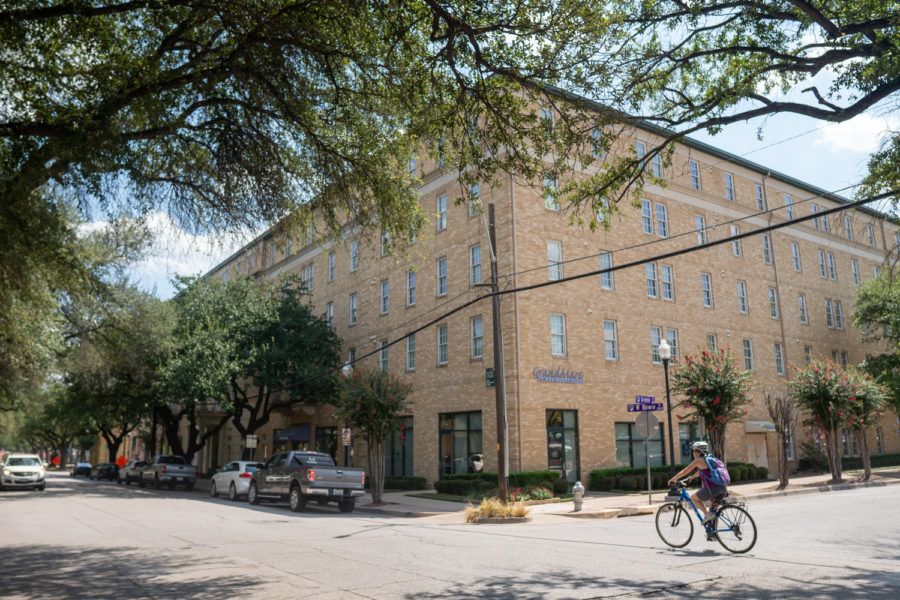
Outside the North Tower of GrandMarc at West Berry Place, an apartment complex, on Sept. 9, 2022. (Esau Rodriguez Olvera/ Head Staff Photographer)
Outside the North Tower of GrandMarc at West Berry Place, an apartment complex, on Sept. 9, 2022. (Esau Rodriguez Olvera/ Head Staff Photographer)
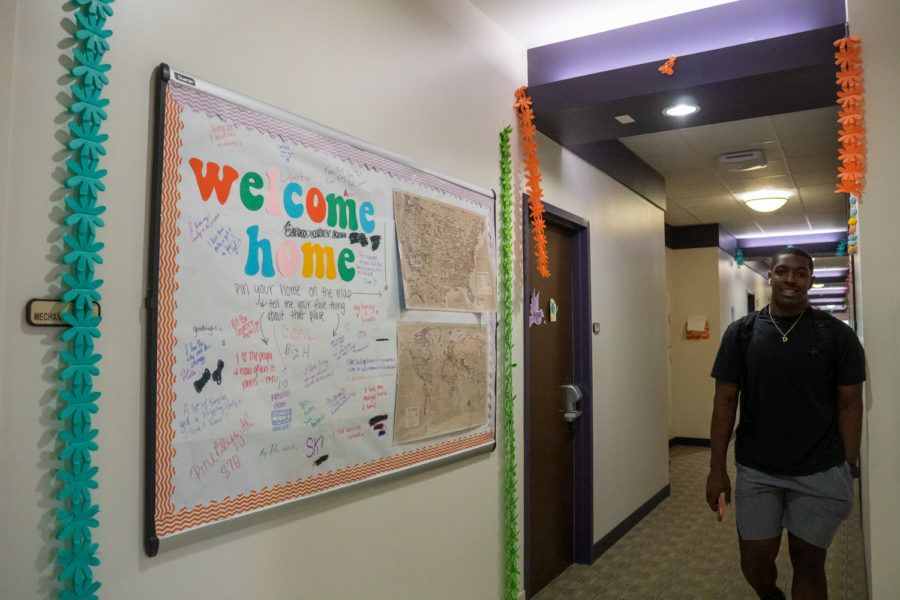
Students walk to class from P.E. Clark Hall on Sept. 9, 2022. (Esau Rodriguez Olvera/Head Staff Photographer)
Students walk to class from P.E. Clark Hall on Sept. 9, 2022. (Esau Rodriguez Olvera/Head Staff Photographer)
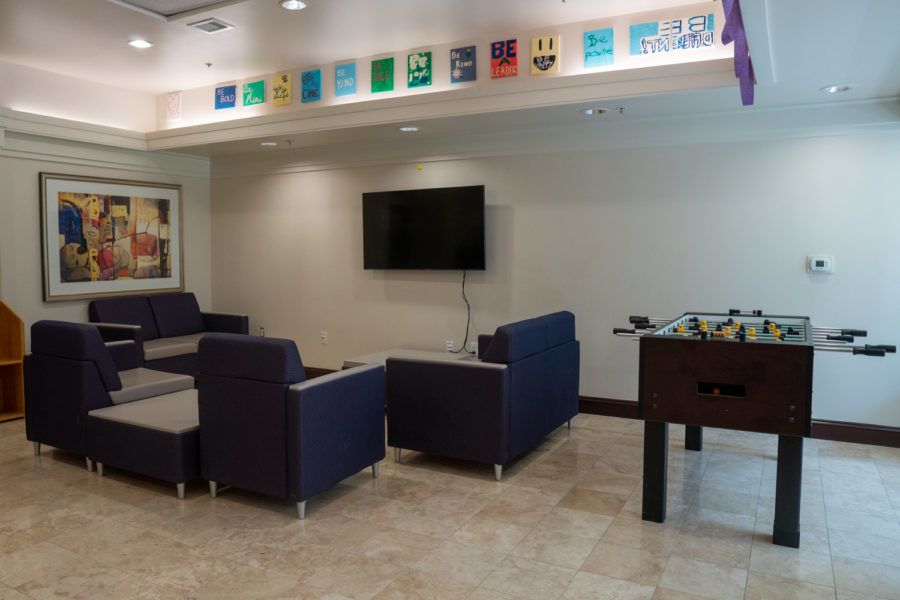
King Hall main lobby on Sept. 9, 2022. (Esau Rodriguez Olvera/Head Staff Photographer)
King Hall main lobby on Sept. 9, 2022. (Esau Rodriguez Olvera/Head Staff Photographer)
Over at least the last decade, on-campus housing has always been over 100% occupied, meaning some students are living in lounges, triples or off-campus apartments.
Housing didn’t add any new triples or quads this year. In fact, TCU scaled back. There was too much strain on facilities, residence assistance and staff members.
“Physically we could buy more beds, and we could make them all triples,” Allen said. “But there comes a point where it's just not a good idea. And we've hit that point.”
Still, over 300 students live in a triple.
“I would love to not have triples, but right now we have to and the alternative of not having students live on campus at all, to me is a much worse alternative,” Allen said.
Housing capacity — not including quads, triples and converted lounges — is around 4,400.
Adding the beds from GrandMarc, Liberty Lofts and Village East apartments and the triples, housing officials have managed to raise it to 5,300.
“There is no more cushion,” Allen said. “And still we’re short.”
There are no more beds to find, Allen said.
Pushed off campus
Carter and Samuelson Halls — two dorms in the Campus Commons meant for sophomores — now house first-year students. Housing officials went through P.E. Clark Hall and King Hall floor by floor figuring out how many first-year students could fit.
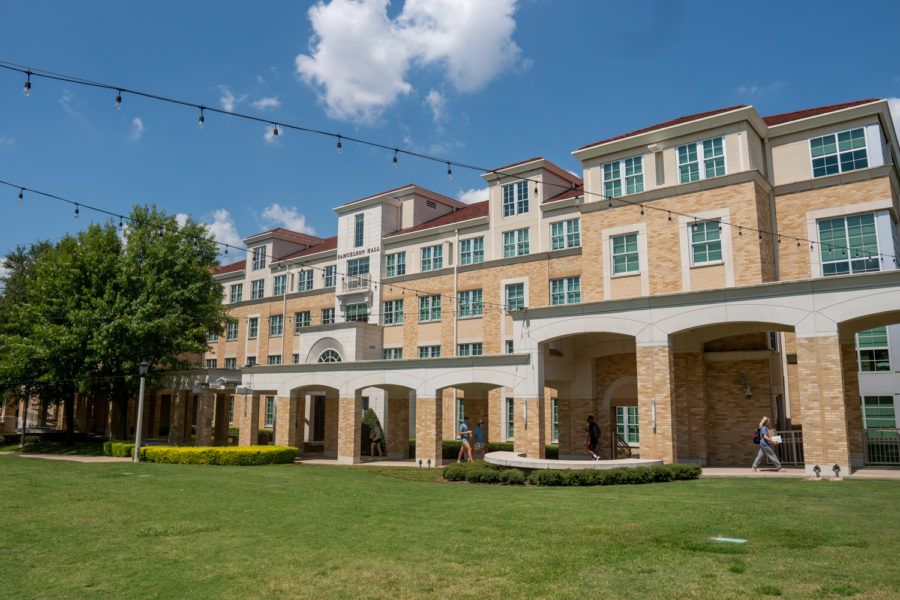
Samuelson Hall in the Campus Commons on Sept. 9, 2022.(Esau Rodriguez Olvera/Head Staff Photographer)
Samuelson Hall in the Campus Commons on Sept. 9, 2022.(Esau Rodriguez Olvera/Head Staff Photographer)
Sophomores are in apartments like GrandMarc and Liberty Lofts. While TCU housing doesn’t own these buildings, they are part of the housing strategy.
Sophomores are required to live on campus, but amid the housing crunch about 20 volunteered to move off campus and the housing department allowed them to do so.
“Many of them unfortunately are not in a position where they wanted to do that, or it was late for them to go and find something,” Allen said.
Four or five years ago, more than 800 juniors and seniors lived on campus. Now there are few options. Living on campus has been mostly limited to sorority and fraternity chapter Resident Assistants, residence hall RAs, full scholarship athletes, community scholars, STEM scholars and ROTC scholars.
“We have pushed and pushed and pushed them out over the last many years, and that is possible. But it's not ideal,” Allen said.
For some, moving off campus doesn’t make sense financially or academically. Some students need flexible leases while others have scholarships that cover four years of on-campus living.
Allen said students have told him finding off-campus housing near campus is “almost not possible.”
Lisa Brenner, a TCU mom and owner of three student rental houses near Bluebonnet Circle, has seen students struggling to find off-campus housing firsthand.
“Everybody living in one of my houses is graduating in December and needed a short-term lease and couldn't find one, and they all had dogs,” Brenner said. “They were frustrated.”
Already, Brenner is seeing students looking to secure rentals for the 2023-24 school year and sometimes considering a two-year lease.
Even if there is a room near campus, prices can climb up to $1,500 a month as property taxes, insurance, utilities and repairs push owners to raise rents.
“Even the guy that takes care of the lawn, I mean, it costs more at every level,” Brenner said.
Students without vehicles are put in a tough situation, and those who look farther away to cut costs can become less connected to the TCU community.
“As an institution that wants to be more inclusive, what could be a worse message than to say, ‘We really want to be more inclusive, but you're gonna have to go live in the five mile away place by yourself, but those of you who can afford it can live close to campus.’ And so for that reason, we also have to consider building so that we can have housing for those students who can't afford to live around campus.”
For some potential transfer students, the lack of housing is a dealbreaker.
Transfers who applied early had a shot at living on campus, but around June almost none got into on-campus housing, Allen said.
“Except for recently we've managed to squeeze maybe 10 or 15,” he added.
Housing officials saw over 100 transfer student applications for on-campus living. More than half were turned away, Allen said.
Brenner has seen transfer students “scramble” to find a place off-campus after waiting to find something, assuming that on-campus housing would be available.
“This year especially was so hard because quality rentals at a fair price were snapped up so quickly,” Brenner said. “There was just nothing.”
Without on-campus housing, some transfers decide not to come.
“I can think of at least a handful of students — because I talked to them and their parents who are from Pennsylvania, Connecticut, California, Colorado — pretty much said, ‘If there's no on-campus housing my student isn't coming.’ So we lost them as students,” Allen said.
Will adding more housing be enough?
The last new residential buildings — Richards and Arnold Halls — opened in fall 2019, adding about 300 beds. This barely bought housing officials a couple of years before they were scrambling to find beds.
The parking lot behind the Neeley School of Business — bordered by Merida and Lubbock Avenues and West Lowden Street — will soon be the site of TCU’s first residence halls on East Campus. The two halls will house up to 280 first-year students in close proximity to a dining hall that will seat up to 700. The beds are expected to be ready in the fall of 2024.
“The problem is that, that only barely gets us caught up to where we need to be today,” Allen said. “It doesn't allow for future growth, so we know there needs to be more. But I feel very confident that we're going to be having those discussions.”
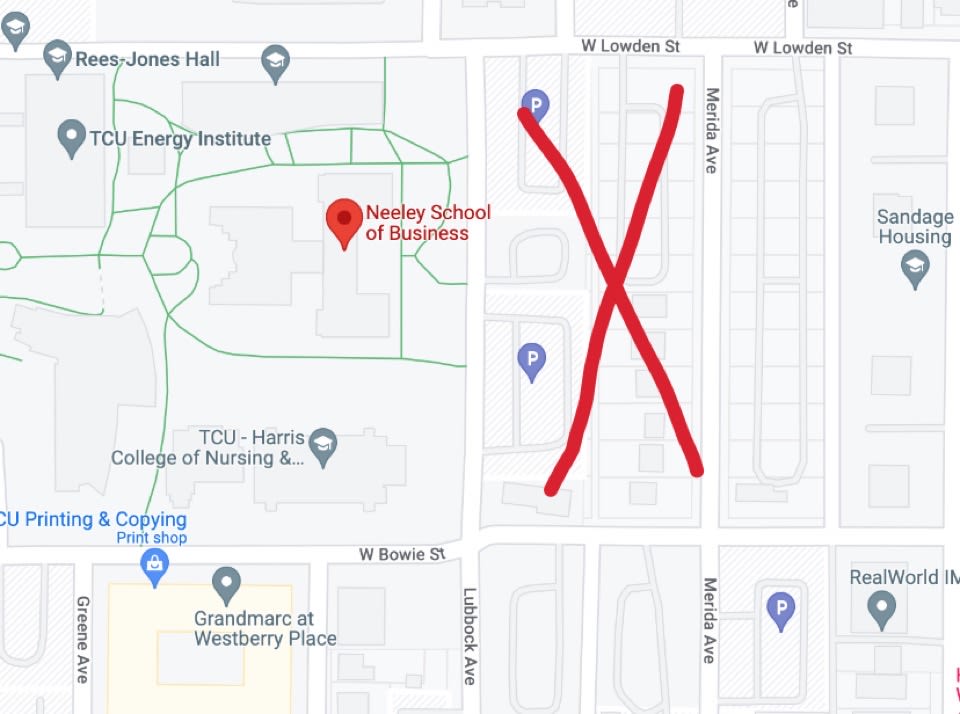
The soon-to-be site of TCU’s first residence halls on East Campus.
The soon-to-be site of TCU’s first residence halls on East Campus.
